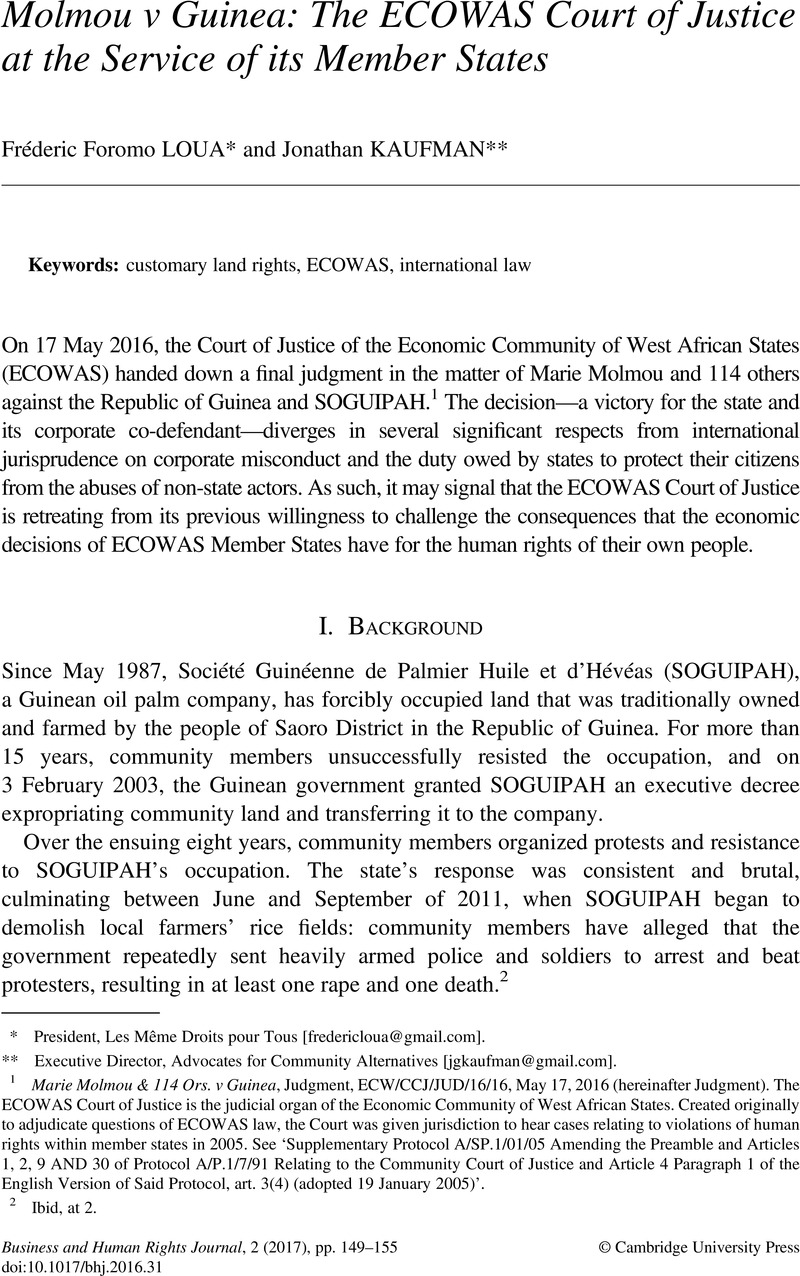No CrossRef data available.
Article contents
Molmou v Guinea: The ECOWAS Court of Justice at the Service of its Member States
Published online by Cambridge University Press: 23 December 2016
Abstract

- Type
- Developments in the Field
- Information
- Copyright
- Copyright © Cambridge University Press
Footnotes
President, Les Même Droits pour Tous [[email protected]].
Executive Director, Advocates for Community Alternatives [[email protected]].
References
1 Marie Molmou & 114 Ors. v Guinea, Judgment, ECW/CCJ/JUD/16/16, May 17, 2016 (hereinafter Judgment). The ECOWAS Court of Justice is the judicial organ of the Economic Community of West African States. Created originally to adjudicate questions of ECOWAS law, the Court was given jurisdiction to hear cases relating to violations of human rights within member states in 2005. See ‘Supplementary Protocol A/SP.1/01/05 Amending the Preamble and Articles 1, 2, 9 AND 30 of Protocol A/P.1/7/91 Relating to the Community Court of Justice and Article 4 Paragraph 1 of the English Version of Said Protocol, art. 3(4) (adopted 19 January 2005)’.
2 Ibid, at 2.
3 See Loua, Fréderic Foromo, ‘Our legal actions tell companies they cannot abuse the rights of communities and remain unpunished’, Business and Human Rights Resource Centre Google Scholar, available at https://business-humanrights.org/en/our-legal-actions-tell-companies-they-cannot-abuse-the-rights-of-communities-and-remain-unpunished (accessed 6 October 2016).
4 Judgment, note 1, at 6.
5 International Convention on Civil and Political Rights, UN Doc A/6316 (1966), 999 UNTS 171 (entered into force 23 March 1976), Art 1, para 2 (‘In no case may a people be deprived of its own means of subsistence.’).
6 Universal Declaration of Human Rights, GA Res 217A (III), UN Doc A/810 at 71 (1948), Art 17.
7 African Charter of Human and People’s Rights, OAU Doc. CAB/LEG/67/3 rev. 5, 21 I.L.M. 58 (1982) (adopted 27 June 1981, entered into force 21 October 1986), Arts 21, 24.
8 Judgment, note 1, at 9.
9 Ibid at 10.
10 Ibid at 10–11.
11 For example, US federal court decisions under the Alien Tort Statute have, on a number of occasions, concluded that the ICCPR can be used as evidence of universal principles of customary international law that are applicable to non-state actors, such as the prohibition on arbitrary detention or violations of the right to life and physical integrity. See, e.g., Bowoto v Chevron Corp., 557 F. Supp. 2d 1080, 1090 (N.D. Cal. 2008); Khulumani v Barclay Nat’l Bank Ltd., 504 F.3d 254, 284 (2d Cir. 2007).
12 See, e.g., Committee on the Elimination of All Forms of Discrimination Against Women, General Recommendation No. 34 on the rights of rural women, CEDAW/C/GC/34 para 13 (4 March 2016) (‘States parties should regulate the activities of domestic non-State actors within their jurisdiction, including when they operate extraterritorially. GR 28 (2010) on the core obligations of States parties under article 2, reaffirms the requirement under article 2(e) to eliminate discrimination by any public or private actor, which extends to acts of national corporations operating extraterritorially.’); UN Human Rights Committee, Concluding observations on the sixth periodic report of Canada, CCPR/C/CAN/CO/6 para 6, (13 August 2015) (noting concern about human rights abuse by Canadian companies and failure of Canadian state to enact a legal framework that would regulate them effectively or facilitate access to justice).
13 This principle is perhaps most often tested in the context of arbitrary detention. See, e.g., UN Human Rights Committee Communication No. 770/1997, Gridin v Russian Federation (views adopted on 20 July 2000), in UN Doc GAOR, A/55/40 (vol. II) 175, para 8.1 (failure to comply with domestic law requiring arrest warrant to be issued within 72 hours of arrest rendered detention unlawful and therefore inconsistent with ICCPR Art. 9(1)). However, the notion of compliance with domestic law as a prerequisite for legality under international law is also a common feature of protections against expropriation in international investment treaties. See Newcombe, Andrew Paul and Paradell, Lluís, Law and Practice of Investment Treaties: Standards of Treatment (Alphen aan den Rijn: Kluwer Law International, 2009) 375–376 Google Scholar.
14 Judgment, note 1, at 9–10. Moreover, by using this logic, the Court also completely misunderstands the situation of the community of Saoro, where a majority of the population is illiterate and deprived of all financial means of asserting their rights in court.
15 See Hadijatou Mani Koraou v Niger, Judgment No. ECW/CCJ/JUD/06/08 para 45, 27 October 2008.
16 The judgment states only:
In law, the notion of people is subject to several meanings, but none of them can be applied to the inhabitants of Saoro … They cannot … invoke any particular characteristic, cultural or otherwise, that would grant them autonomy within the Guinean nation; the collective applicants do not constitute a “collectivity” as that term is understood under international law and cannot invoke the prerogatives that attach to a “people” … .
Judgment, note 1, at 9.
17 Centre for Minority Rights Development (Kenya) and Minority Rights Group International on behalf of Endorois Welfare Council v Kenya, Comm. No. 276/2003 para 151, African Commission on Human and Peoples’ Rights (2006) (hereinafter Endorois Case).
18 Ibid, para 162.
19 Ibid, para 149.
20 Dictionnaire de français Larousse, definition of peuple, available at http://www.larousse.fr/dictionnaires/francais/peuple/60039?q=peuple#59668 (accessed 6 October 2016).
21 Applications 8803–8811/02, 8813/02 and 8815–8819/02 (2004), paras 138–9.
22 The Mayagna (Sumo) Awas Tingni Community v Nicaragua, Judgment of 31 August 2001, Inter-American Court of Human Rights, (Ser. C) No. 79 (2001) paras 140(b), 151.
23 Endorois Case para 187.
24 Judgment, note 1, at 10.
25 Ibid.
26 Ibid.
27 Judgment, ECW/CCJ/JUD/18/12 para. 98, 14 December 2012 (analyzing whether Nigeria had violated Art. 24 of the African Charter, which requires that ‘All peoples shall have the right to a general satisfactory environment favourable to their development’).
28 See, e.g., ‘Domesticate ECOWAS mining principles – gov’t told’, Reportingoilandgas (22 April 2015), available at http://www.reportingoilandgas.org/domesticate-ecowas-mining-principles-govt-told (accessed 6 October 2016).


